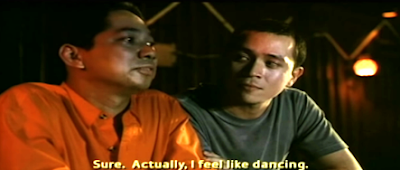the moviegoer
by Douglas Messerli
Mark V. Reyes (screenwriter and director) Last
Full Show / 2005 [19 minutes]
Philippines director Mark V. Reyes’ debut film
was Last Full Show (2005) in which a wealthy young high school student,
Crispin (Francis Villanueva) asks his driver, Bert (Nanding Josef), to stop one
evening on his way home and wait while he takes in a movie at a local theater.
This particular movie house, in some senses, is more like a gay bar than
a porn theater, showing regular films, mostly in English to a crowd most of
whom know one another and are regulars, couples often pairing off into regular
duos, probably for most of them the only place where they can go to have gay
sex outside of a cheap motel. And here are also the old-timers like Gardo
(Sugus Legaspi), a man in his mid-to-late 30s and his friend, the younger Jess
(Jeremy Aguado) who introduced him years previous to the niceties of movie
palace sex. These days the friends stand mostly behind the seats commenting on
the goings-on before them almost like guides to the world with its own rituals
and codes of behavior.
Despite the “No minors” restriction, our young hero seems to have no
difficulty with the ticket seller (Mae Paner) in getting in, and the commenting
duo note the arrival of the young “twink” who almost the moment he sits in the
center of the theater is joined by an older man, his shirt already lifted as if
ready for immediate sexual activity. Crispin quickly moves a few seats off, and
Jess suggests that perhaps Gardo should try “a dance” just to see if he is what
the boy is looking for.
Gardo takes him up on the dare, and in a few moments the two are
kissing, Jess the next day joking with his friend about what a dirty old man he
is attempts for find out how big or small the boy’s dick was.
Soon after, when the movie breaks down, Gardo suggests the boy join him
at his favorite soup house, where they dine on the restaurant’s specials, he
asking about the boy’s schoolwork, advising him to study hard, while the
younger asks Gardo about work.
What we see is what often happens in such May-September pairings, or
used to occur even in the old days when gay bars did not strictly restrict
underage men. The boy, who’s apparently businessman father obviously does not
spend much time with his son since there appears to be no
The next time we see the two together it is simply for a date, with no
movie involved, when the boy presents Gardo with a present, evidently an
“antique” necklace, a gift which we recognize by the way he wears and holds it
over the next several frames, that has truly touched the older man.
But as he cherishes the necklace, so we observe Crispin in his room
pinning up yet another movie ticket to his wall filled with hundreds of them in
all colors—far more than he might gathered over the nights of movie-going with
Gardo. To emphasize this, the camera begins with a “close up” of the tickets,
quickly pulling back to reveal an even larger space than we might have first
Perhaps we have been so fearful of how Gardo might be treating the boy
that we have missed the fact that the boy has turned his habit into an
addiction, with Bert having each time when the boy finally determines to break
off the “romance.”
This is the last full movie, at least for a while, for the teenager, who
returns to the car looking sad and disappointed, maybe even a bit tearful as he
tells Bert, “I just want to go home please.”
Bert answers with his usually perfunctory “Yes sir,” but for the first
time in the film addresses him by his name, “Crispin.”
The reality hits us, probably mostly movie goers closer in age to Gardo,
with a slight punch. It is the elder who is most deeply hurt, for he knows that
it is likely that another such boy might never again enter his life. Next time,
as he joked to Jess in the very first scene, he will simply be watching the
movie.
Los Angeles, October 15, 2021
Reprinted from World Cinema Review (October
2021).



.png)



No comments:
Post a Comment